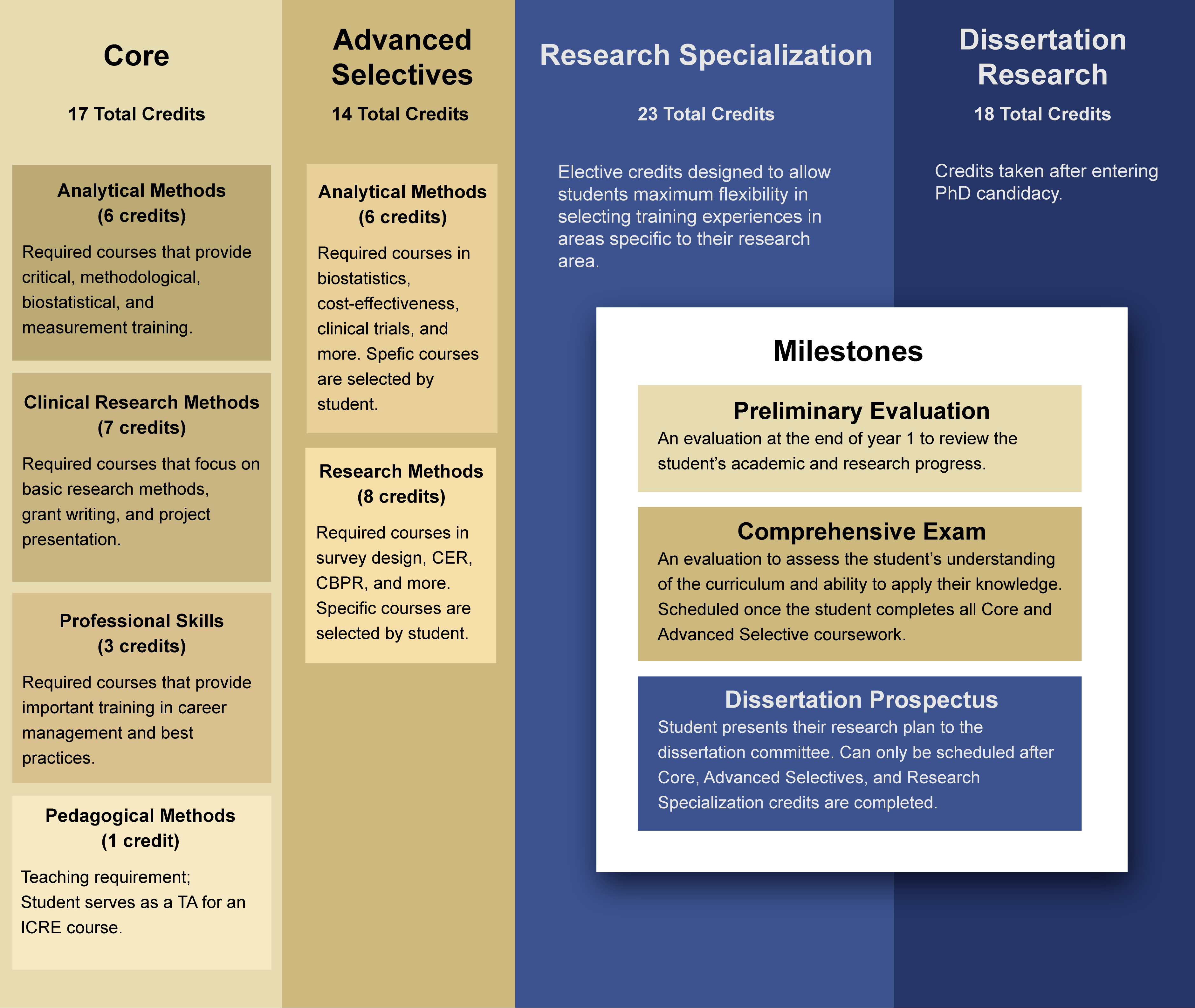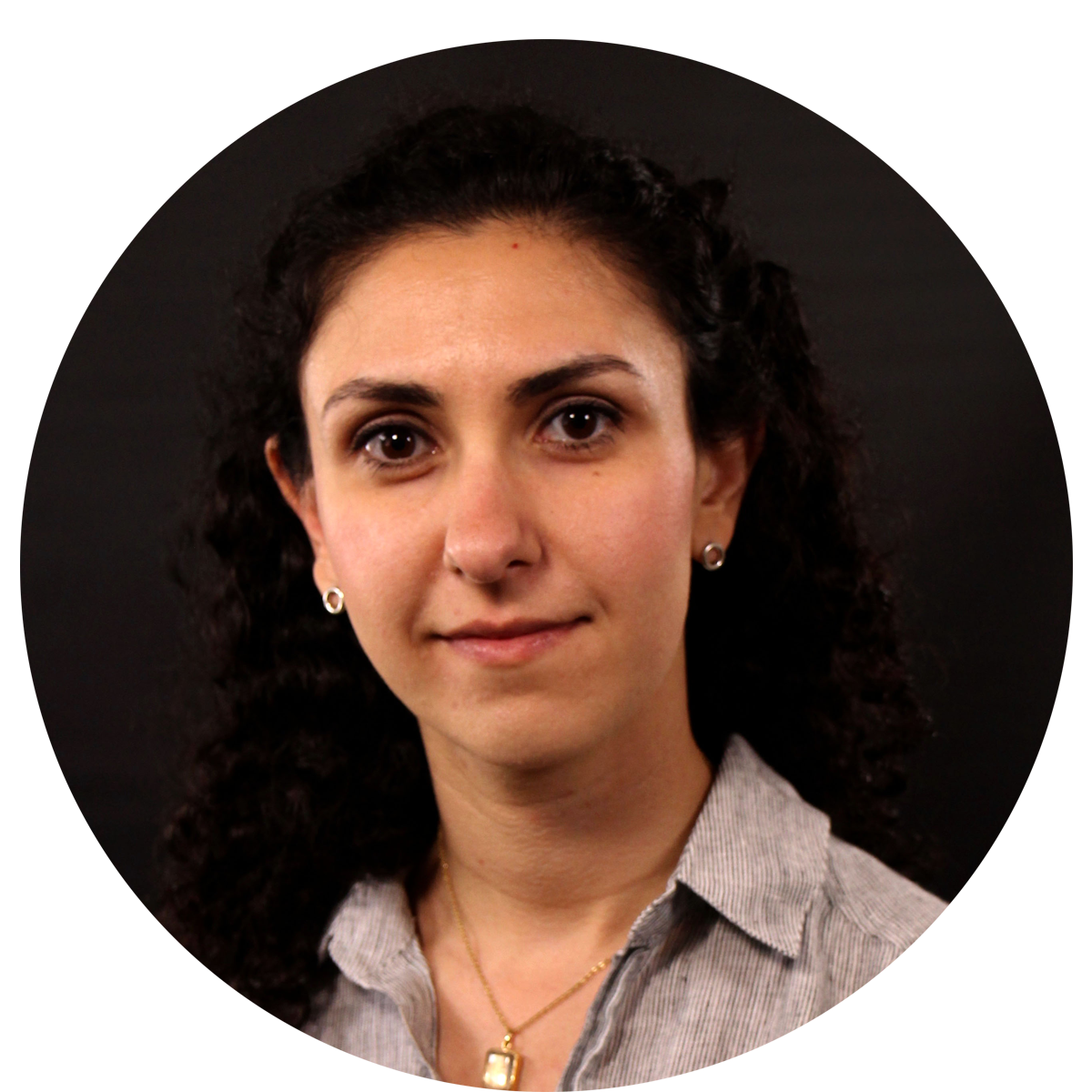Doctor of Philosophy in Clinical and Translational Science
Program Details
The curriculum of the PhD Program in Clinical and Translational Science comprises several components that enable students to engage simultaneously in didactic coursework and practical research experiences. The PhD in CTS also offers specialty programs for residents (LINCS) and MSTP trainees (MD/PhD).
The PhD in Clinical and Translational Science curriculum is organized into 4 categories of coursework: Core, Advanced Selectives, Research Specialization, and Dissertation Research. While students advance through the program they will also complete the Preliminary Evaluation, Comprehensive Exam, and Dissertation Milestone.

PhD in CTS students are required to attend eight 1-hour CTSI Responsible Conduct in Research workshops or enroll in the ICRE course CLRES 2050: Ethics and Responsible Conduct of Research. At the time of graduation, students must have at least 8 hours of RCR training through CTSI or have successfully completed CLRES 2050 in order to be eligible to graduate.
A central element of the PhD Program in Clinical and Translational Science at the University of Pittsburgh is participation in mentored research.
Students may work with faculty who are from the School of Medicine or any of the other five schools of the health sciences (the Graduate School of Public Health, the School of Dental Medicine, the School of Health and Rehabilitation Sciences, the School of Nursing, and the School of Pharmacy) and who conduct clinical or translational research funded by the National Institutes of Health (NIH) or other federally funded institution. An optimal mentored research experience will be characterized by at least three features:
- The valued input of experienced and responsive mentors.
- Involvement in an interesting research project that the student can take ownership of.
- The opportunity to work as part of a multidisciplinary team that provides exposure to all phases of research: conception, design, grant writing, recruitment and consent, data collection and analysis, and dissemination of results.
All PhD students will be expected to choose a primary and secondary mentor by the start of the first year of the program. The program director will assess the compatibility of the student’s proposed research with their selected mentors or will help students identify a mentor if one has not already been selected. Throughout the student's research experience, the program directors will monitor the relationship to ensure the student’s learning needs are met.
The ICRE offers various resources on mentoring.
The Leaders IN Clinical and Translational Science (LINCS) Program for Residents is an innovative program that combines a doctoral degree in clinical and translational science with a medicine residency and subspecialty fellowship training. The program is designed to prepare outstanding medical residents for a career in academic medicine and clinical and translational research.
Residents who have research experience and want a rigorous, advanced training program that enhances their capabilities of conducting independent, high-quality clinical and translational research can pursue the American Board of Internal Medicine (ABIM) Research Pathway Residency (short track) in combination with a PhD conferred by the School of Medicine.
In the LINCS Program, a 2-year period of medical residency training is followed by 3 or more years of mentored research, coursework, and dissertation research. This work is then followed by 1 to 2 years (or sometimes more) in a subspecialty fellowship. Individuals who are interested in the PhD must apply to the ABIM Research Pathway of the Internal Medicine Residency Program, apply simultaneously for the PhD Program in Clinical and Translational Science, and declare their interest in a particular medical subspecialty for the fellowship.

Mentorship
An important element of the LINCS Program is learning to be an independent investigator. Integrated, multidisciplinary mentoring teams guide the growth and development of residents. Residents may work with faculty members who conduct federally funded clinical or translational research in any of the schools of the health sciences. Typically, a resident will seek a primary mentor from within his or her own discipline and will seek secondary mentors from other disciplines related to the research area of interest. The program monitors the mentoring relationships to ensure that residents are being prepared for independent research. This involves active participation in and exposure to all phases of research, including conception and design of studies, grant writing, recruitment of study subjects, data collection and analysis, and dissemination of results.
Admission Requirements
Prospective applicants who have received an invitation to interview for a residency position at the University of Pittsburgh Medical Center (UPMC) should apply to the LINCS Program before their scheduled interview. Admission into the LINCS Program requires a match for a residency program at UPMC and requires an acceptance into the PhD Program in Clinical and Translational Science.
Support
Residents in the LINCS Program are eligible for stipends and tuition provided through training grants in subspecialty divisions, through the University of Pittsburgh's Clinical and Translational Science Institute or through individual National Research Service Awards. Because the recruitment and training of clinician-researchers is such a high priority at the current time, the National Institutes of Health (NIH) has implemented a loan repayment program for doctors who commit to a career in clinical research. Individuals in the LINCS Program may consider applying for the loan repayment program when their residency is completed.
The Medical Scientist Training Program (MSTP) of the University of Pittsburgh and Carnegie Mellon University offers exceptionally talented individuals the opportunity to undertake a physician-scientist training program tailored to their specific research interests. During a period of 6 to 8 years, students meet the degree requirements of both graduate school and medical school, thus acquiring the knowledge, skills, and experience to begin careers in some of the most exciting areas of medical research.
The PhD Program in Clinical and Translational Science is 1 of 22 participating graduate programs that foster the development of future biomedical researchers by providing the highest quality of graduate medical training. The PhD Program in Clinical and Translational Science was created to produce the next generation of multidisciplinary academic leaders whose innovative research will apply combinations of basic, clinical, and population sciences to the current problems of health and medical care. The graduate program provides students with advanced knowledge of research concepts and the skills they need to develop into independent clinical and translational science (CTS) investigators.
MD/PhD Curriculum Overview
As part of the program, students will:
- Participate in monthly MSTP/CTS PhD seminars beginning in their first year of medical school.
- Conduct full-time mentored research for 8 weeks between their first and second years of medical school.
- Take a leave of absence from medical school courses to enroll in the graduate arm of the School of Medicine between the second and third years of medical school and to complete the PhD coursework, conduct research, and defend their dissertation.
Tuition and Fees
Information regarding tuition and mandatory University Fees is maintained by the University of Pittsburgh Office of Institutional Research. The ICRE’s Clinical and Translational Science (CTS) Fellowship is a potential source of funding for PhD in CTS students. For fellows, residents, faculty, and staff at the University of Pittsburgh, the ICRE will work with departments or divisions to estimate program costs and facilitate support.
Financial Aid
The Institute for Clinical Research Education does not provide financial aid. Unless students have other funding sources, they are responsible for covering the tuition costs, taxes, and fees associated with their course enrollment.
Many individuals accepted into the ICRE degree-granting programs have faculty- or student-based affiliations with the University of Pittsburgh or University of Pittsburgh Medical Center (UPMC). Faculty, fellows, or medical residents at these institutions may be eligible for tuition benefits. For complete information, contact University of Pittsburgh Office of Human Resources or the UPMC Tuition Assistance Employee Service Center (1-800-994-2752; press option 3).
![]() PhD Program in CTS Handbook [PDF]
PhD Program in CTS Handbook [PDF]
A comprehensive record of information relevant to the PhD in Clinical and Translational Science Program.

"The core curriculum of the PhD in CTS imparts the fundamental principles of clinical research in an accessible and applicable manner. I was able to customize my course work to accommodate my research agenda by choosing from a variety of exceptional electives."
- Sara Myers, MD
General Surgery Resident (PGY-4), University of Pittsburgh
Current PhD in Clinical and Translational Science Trainee

 Degree Programs
Degree Programs PhD in CTS - Program Details
PhD in CTS - Program Details



